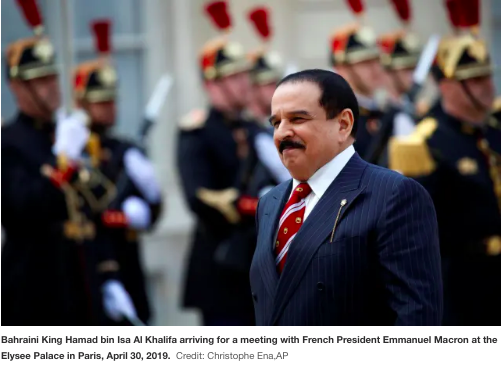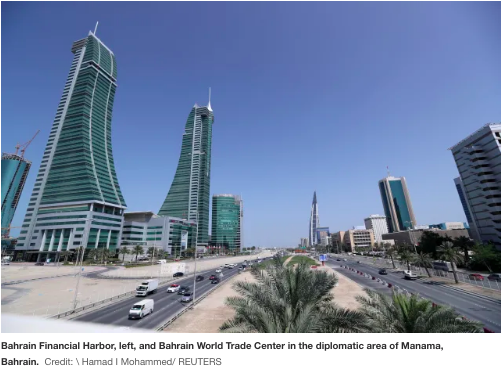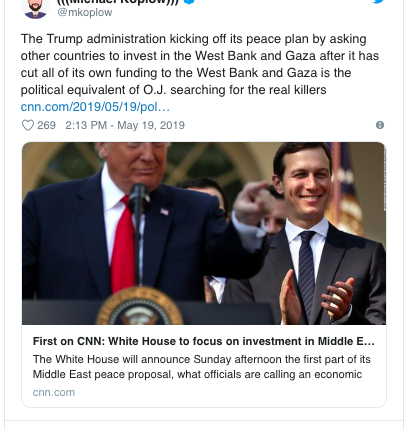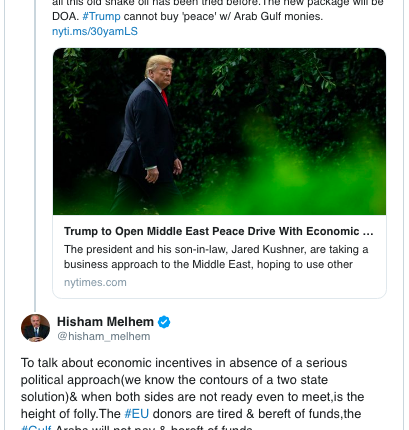
Haaretz
By Amir Tibon
May 20, 2019
By agreeing to host next month’s economic forum, Bahrain gave a boost to Jared Kushner’s peace efforts. Now the main question is: Will the Gulf states actually pull out their checkbooks?
The White House made headlines Sunday by announcing that it will release the economic part of its plan for Middle East peace in late June.
The most important detail of the announcement, however, wasn’t related to the plan itself: It was the fact that Bahrain, a tiny Arab kingdom in the Persian Gulf, will host a conference on June 25-26 to promote the program and discuss investments in the Palestinian economy.
Last month, Haaretz reported on the battle being waged behind the scenes between the Trump administration and the Palestinian Authority over the fate of the “Trump peace plan” — or as it is often called in the Arabic media, the “deal of the century.”
There is no doubt the PA will reject the plan, which Palestinians believe will be grossly one-sided and tilted toward the positions of Israel’s right-wing government. Yet the more consequential question is what the reaction will be in the broader Arab world.
The Palestinians want to see the plan rejected by the entire Arab world, but especially by the largest and most powerful Arab countries — Saudi Arabia and Egypt. The Trump administration, meanwhile (including the president’s son-in-law and special adviser, Jared Kushner), wants the plan to either be accepted by some Arab countries or, at the very least, not completely rejected by them. A scenario in which several Arab countries declare that the plan is not perfect but could be a “basis for discussions” will probably be seen as an achievement inside the White House — and a burn for the PA.
This helps explain why Bahrain’s decision to host an economic “workshop” following the release of the economic chapter of the peace plan could be more significant and newsworthy than the actual release of the plan.

Bahrain is a close ally of Saudi Arabia and has a history of secret, quiet ties with Israel. By hosting next month’s event, it is signaling that at least one small Arab country is willing to give the economic chapter of the U.S. peace plan a chance — and that it won’t be shocking if other countries follow suit.
This doesn’t mean the White House can declare victory, however. Hosting an economic workshop, or participating in one, is not the same as actually investing money in economic projects in Gaza and the West Bank. Talk is cheap, whereas infrastructure projects cost billions of dollars.
Will Saudi Arabia and the United Arab Emirates, who have more resources than Bahrain, agree to write generous checks to the Palestinians based on a peace plan they haven’t fully seen, and which is sure to be rejected by the Palestinian leadership? That remains an open question.
So far, the only Arab state actually putting money into the Palestinian arena is Qatar, the regional rival to the Saudi-Emirati alliance. But even the $480 million that Qatar recently agreed to deliver to the Palestinians, both in Gaza and the West Bank, is chump change compared to the kind of projects to be included in the Trump peace plan. Right now, no one can say where the money is supposed to come from.

Critics of the Trump administration’s policies noted Sunday that the United States was planning to ask other countries to fund its “economic vision” for the Palestinians, just a year after Trump cut the entire U.S. aid budget to them — including $10 million that was taken away from programs to encourage Israeli and Palestinian cooperation in sports and culture, and $25 million cut from hospitals in East Jerusalem that treat Palestinian cancer patients.
“The Trump administration kicking off its peace plan by asking other countries to invest in the West Bank and Gaza after it has cut all of its own funding to the West Bank and Gaza is the political equivalent of O.J. searching for the real killers,” wrote Michael Koplow, policy director of the Israel Policy Forum (an organization that supports the two-state solution), referencing O.J. Simpson.

Hisham Melhem, a journalist and analyst at the Arab Gulf States Institute in Washington, cautioned: “To talk about economic incentives in absence of a serious political approach … & when both sides are not ready even to meet, is the height of folly.” He added that European donor countries are “tired and bereft of funds,” and that Gulf Arabs “will not pay.”

If his prediction is correct, the administration will have a hard time finding ways to promote the economic initiatives — unless, of course, Trump changes his mind and decides that the United States should pay for them with its own money (something that is very unlikely to happen).
Still, for the White House, Bahrain’s decision to host the event is a positive development that shows some goodwill on behalf of the U.S.’ Arab allies. Rabbi Marc Schneier, a New York-based Orthodox leader who has close ties to King Hamad of Bahrain, told Haaretz that “this is definitely a breakthrough. It’s not surprising that Bahrain took this step: Bahrain wants to lead the efforts for peace in the region.”
Schneier, who is a special adviser to King Hamad, predicted that “there will be representation on behalf of most Arab countries, including the Gulf countries. These countries share common interests with Israel and they want to work toward peace. They understand that economics will be the engine of this peace plan, and that investments on the ground can make the political aspects easier to deal with.”
The Palestinians have already declared they won’t attend the event — and that includes not only the political leadership but also prominent Palestinian business leaders from the private sector.
The battle between the Trump administration and the PA over the Arab world’s view of the plan will continue after next month’s event, and it’s too early to predict who will win it.
Copyright © 2025 Foundation For Ethnic Understanding. All rights reserved. | Privacy Policy